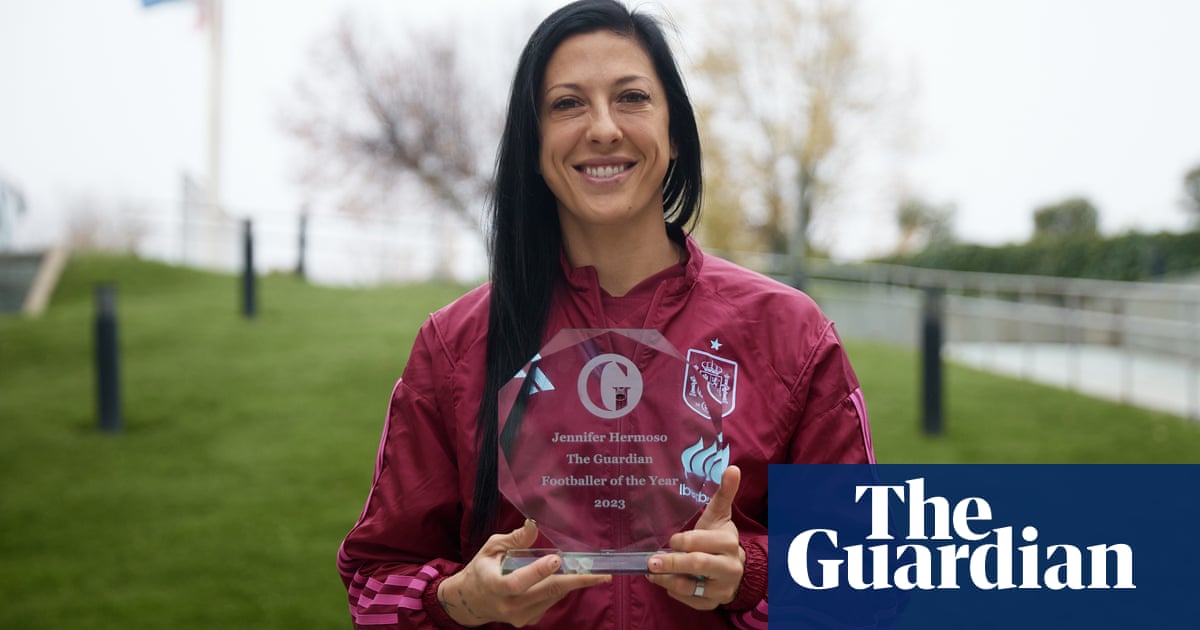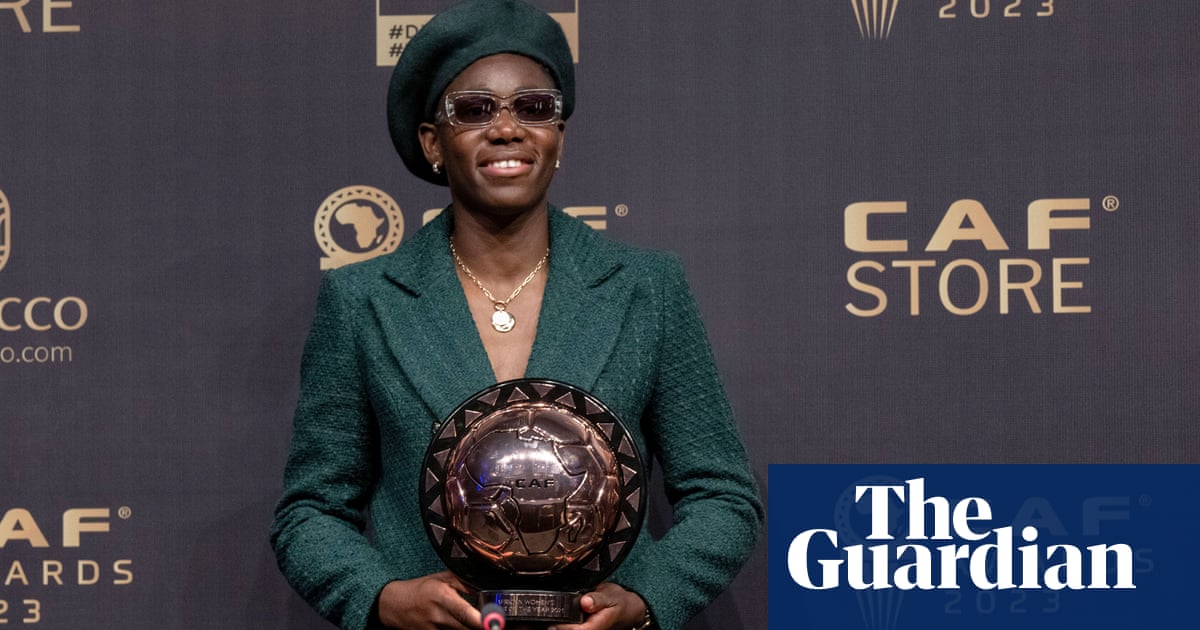
In the moment of her greatest triumph, Spain’s World Cup winner became the focal point of football’s battle against misogyny
by Suzanne Wrack
Fri 29 Dec 2023 12.00 GMT
The Guardian Footballer of the Year is an award given to a player who has done something remarkable, whether by overcoming adversity, helping others or setting a sporting example by acting with exceptional honesty.
On 27 October 2023, 21 minutes after stepping onto the pitch with a star above the badge on the shirt of her national team for the first time, Jenni Hermoso screamed with cathartic energy. It was the talismanic two-time Ballon d’Or winner Alexia Putellas who had wriggled free in the box and had a shot pushed away by Italy goalkeeper Laura Giuliani, but it was Hermoso who was there to follow it up, stood unmarked a few feet to the left of the penalty spot, sweeping into the far corner. She raced away, two big low fist pumps accompanied her howl of relief, defiance, and celebration.
Hermoso’s 89th minute strike meant Spain won their third Nations League game 1-0 to maintain their unbeaten start to their campaign but that goal meant so much more than three points on the road towards Olympic qualification, so much more in the context of her extraordinary, challenging, epoch-making year. One where, two months earlier, at the end of a triumphant World Cup final, the greatest moment of her career was instantly shadowed, if not eclipsed, by an unwanted kiss from Luis Rubiales, the president of the Spanish football federation, sparking a controversy that brought the national women’s team’s often private battle against institutional misogyny to a worldwide audience.
Jenni Hermoso celebrates scoring against Italy in October
Jenni Hermoso celebrates scoring a cathartic winner for Spain against Italy in October. Photograph: NurPhoto/Getty Images
At the last gasp of 2023, Hermoso has been named the Guardian’s Footballer of the Year. This award was conceptualised precisely to recognise the achievements of players that have done extraordinary things and overcome great adversity. Hermoso is the eighth winner and fourth woman to win the award, following Khadija Shaw in 2018, Megan Rapinoe, another World Cup winner, in 2019 and Virginia Torrecilla in 2022.
For decades players in Spain have lifted their heads above the parapet, singularly and collectively, only to find themselves maligned and excluded for daring to question the status quo and suggest that the environment around the national team was toxic, that perhaps things could be done differently and better. After the 2015 World Cup, they confronted the federation and forced the end of the 27-year reign of head coach Ignacio Quereda. It wasn’t a win though, because Jorge Vilda, the Under-19s head coach, another company man, was brought in and the senior players who had led the rebellion were phased out.
When 15 players – “Las 15” – withdrew from national team selection after their exit from Euro 2022, citing the impact of the environment on their health, Vilda was backed and they were out, with the manager calling up young players in their stead.
This is the backdrop to what took place at Stadium Australia in Sydney in the Women’s World Cup final on 20 August. Spanish women footballers have been ignored, marginalised and disbelieved. Their team has been the subject of divide and conquer techniques and has felt the force of what happens when you criticise a disciple of those in power.
Luis Rubiales kissed Jennifer Hermoso at the World Cup final.
The moment Luis Rubiales kissed Jennifer Hermoso at the World Cup final. Photograph: Eurasia Sport Images/Getty Images
But, with the eyes of the world watching – including a peak audience 15.9 million across BBC platforms including BBC One and 7.38 million (a 71.1% audience share) on RTVE’s La 1 in Spain for the 1-0 victory over England – cameras trained on the rectangle of grass, and 75,784 watching from the stands, they could no longer be ignored. Hermoso had missed a penalty in the final, saved by England’s Mary Earps. Earps won the Golden Glove award for best goalkeeper at the World Cup and Hermoso was awarded the Silver Ball, runner-up for the best player of the tournament, but they were not the talking points at the closing ceremony.
A revved-up Rubiales celebrated Spain’s win by grabbing his crotch and pointing at disciple Vilda. Then he grabbed the face of Hermoso and planted a kiss on her lips, before later lifting Athenea del Castillo over his shoulder fireman style. His actions were roundly condemned, and his kiss of Hermoso went viral. She was seen saying she “didn’t like it” in the background of a video posted to social media by another player.
Then came the squeeze, Hermoso says she was pressured by Rubiales and his circle and that they wanted her to downplay the kiss, publicly justify it and to say that it was consensual.
But throughout, Hermoso’s stance has been clear and unwavering. In a public statement on 25 August, she said that “at no time was his kiss ever consensual” and that she felt “vulnerable and a victim of an impulse-driven, sexist act”.
Rubiales went on the offensive, but Hermoso refused to cooperate with his attempt to repair his deteriorating reputation. It was four days until Fifa announced it would launch an investigation into Rubiales’ actions. The following day at an extraordinary general assembly of Spain’s football federation, a defiant Rubiales announced his intention to offer Vilda a new four-year €500,000-a-year contract and insisted repeatedly that he would not resign, receiving a standing ovation in the process.
Vilda was sacked on 6 September, but the players refused to accept changes that they concluded were only superficial. On 10 September Rubiales was forced out and, on 30 October he received a three-year ban from Fifa for all football-related activities. A number of other cases, including a judge-led criminal case are ongoing, which is why Hermoso is not currently conducting interviews.












